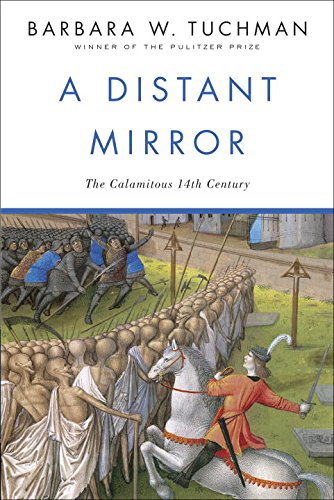 Barbara Tuchman’s A Distant Mirror: The Calamitous 14th Century is an impressive, compelling work with amazing breadth and detail. Though this is not its intended aim, it is very valuable for anyone studying the Reformation because it tells so well the story of life in Europe leading up to the Reformation. Tuchman tells of the amazing insight and advances in technology and medicine, but tells most of the decay of the culture, the abuse of power, the corruption of the church and the despair that came as ceaseless war and the Black Death decimated the population.
Barbara Tuchman’s A Distant Mirror: The Calamitous 14th Century is an impressive, compelling work with amazing breadth and detail. Though this is not its intended aim, it is very valuable for anyone studying the Reformation because it tells so well the story of life in Europe leading up to the Reformation. Tuchman tells of the amazing insight and advances in technology and medicine, but tells most of the decay of the culture, the abuse of power, the corruption of the church and the despair that came as ceaseless war and the Black Death decimated the population.
This book brought to light in a new way for me the crying need for Reform in the Church as there were rival popes, heavy taxes and the Church most often engaged in political maneuvering to protect its institutional prestige and wealth. Tuchman writes:
“In the distracted 14th century, when God seemed hostile to man or else hidden behind ecclesiastical counting of coins and selling of benefices, the need for communion with God was never greater, nor less satisfied by His appointed agents. A Church preoccupied with war in Lombardy and revenues in Avignon and the mundane necessities of maintaining its position was not ministering to popular need.” (316)
It was interesting in this setting to read this description of miracle plays:
“In the miracle plays and mysteries staged for the populace, realism was the desired effect. A system of weights and pulleys resurrected Jesus from the tomb and lifted him to a ceiling of clouds. Angels and devils were made to appear magically through trapdoors; Hell opened and closed its monstrous mouth, and Noah’s flood inundated the stage from casks of water overturned backstage while stone-filled barrels turned by cranks resounded with thunder. When John the Baptist was decapitated, the actor was whisked away so cunningly in exchange for a fake corpse and fake head spilling ox blood that the audience shrieked in excitement. Actors playing Jesus sometimes remained tied to the cross reciting verses for three hours.” (312)
It sounds a lot like what some churches do today as we too chase excitement and distraction, quite possibly failing, as the 14th century church did, to provide the substantive help which people in a decaying culture are longing for.
I think the drive towards such distractions speak to our own dissatisfaction with what God has given to us: the Word preached and read, the Lord’s Supper, Baptism, prayer, and hymns to God. In this way, we are like the children of Israel in our contempt for the “holy manna” God had provided them. The “means of grace” ought to be satisfying to us, for God has given them to us for our spiritual benefit. The plays and distractions only betray our carnality–our inability to behold Christ in the worship prescribed by Christ’s apostles.